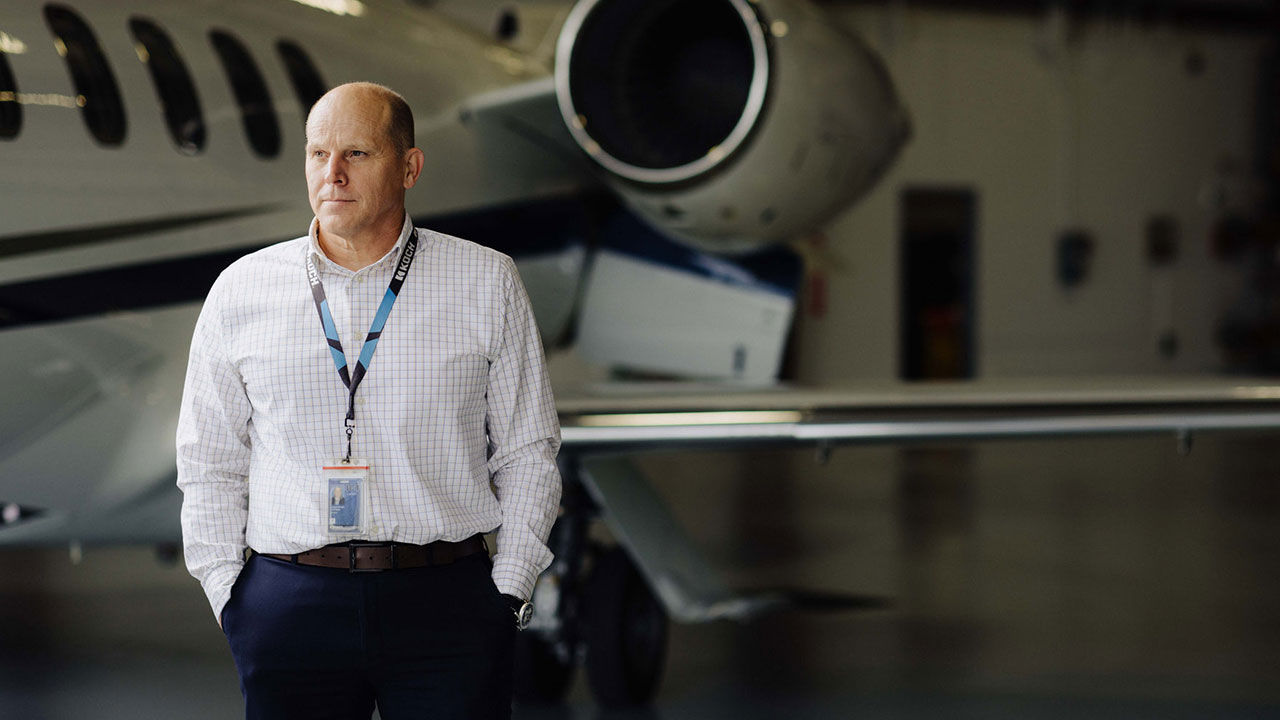A Principled Flight Plan
4 MIN
The Aviation Group thought PBM didn’t apply to them. They learned otherwise.

When Chris Hoffman joined Koch Aviation Group as a pilot in 2016, he believed Koch would provide opportunities to grow and contribute. Unfortunately, Chris’ experience failed to meet his expectations. Aviation’s leadership team used a top-down approach; they acted as if they always knew what was best. Koch’s pilots and maintenance employees kept to themselves and resisted change. The team had no clear vision or direction and didn’t think Principle Based Management (PBM) applied to them. “You would just come in, do your job and go home,” Chris recalls. “There wasn't a lot of meaning to the work beyond operating safely.”
When Chris tried to speak up about ways to improve the team’s operations, his ideas were rejected with a firm ‘no.’ “I should have tried harder to understand the ‘why’ behind those decisions,” Chris said. But after being repeatedly ignored, “I felt discouraged and just became part of the problem.”
Among other things, Chris struggled to understand Koch’s compensation philosophy. (He was used to the industry norm of formulaic pay.) Even after reading the chapter on incentives in “Good Profit,” which had been given to him when he joined Koch, he couldn’t reconcile what he was experiencing with what he read.
When Sheryl Corrigan, Koch’s vice president of environmental, health and safety, was asked to oversee the Aviation Group in 2019, she took the time to get to know the team members and build relationships. She saw gaps in the team’s understanding and application of PBM and recognized the need to make changes.
Meanwhile, Chris was reaching out to others to find answers to his questions. He connected with several long-time employees, including a PBM coach, an IT support colleague and Sheryl. "They all seemed to say the same thing: PBM improves results when employees take action and find ways to apply it,” Chris recalled.
It was clear to Sheryl that only a few Aviation employees were willing to change. Most stuck with their old way of working. “I could understand why people felt that way,” Sheryl said. “When you’re constantly ignored or your ideas are shot down, it’s easy to just give up and do as you’re told.”
After a frank conversation with Sheryl and his supervisor, Chris realized that he had to change the way he was thinking and acting. No one would do it for him. He began speaking up in meetings. He asked how Aviation could better contribute to Koch’s Vision and eagerly participated in the PBM learning sessions Sheryl initiated.
Following a restructuring of the Aviation group, Chris was given the opportunity to become the supervisor of six other pilots. “None of us really grasped the principles as well as we should. As a supervisor, I felt even more accountable for learning and applying them.” He focused on helping his team improve its understanding and application of principles. Within a year, he was asked to lead all of Koch Aviation, reporting to Sheryl.
Chris drove transformation by working with his team to develop a clear vision: to become the new standard for corporate aviation in the community, based on PBM. They worked hard to create an environment that enabled honest feedback and communication. "If there's a problem, we need to talk about it in the moment,” said Chris. “None of this, 'We'll get to that later' like before.” All employees were encouraged to share their ideas, feedback and concerns, and to ask questions. "It was a 100% reset, but we saw it as an opportunity to lay a foundation that was bottom-up instead of top-down."
This approach generated many new learning opportunities – including for Chris. To address the lack of knowledge sharing between maintenance and pilots, Chris experimented with brief, weekly meetings. “I was excited because these had worked for me in the past,” Chris recalled. “But I was the only one driving the meetings. It was completely top-down.” Recognizing it wasn’t working, Chris asked his team for their ideas. The result: a bottom-up, monthly interaction where the team drives the agenda. The Aviation Group’s communication is now much more productive.
The team also focused on better understanding Koch’s Decision Making Framework and improving their economic thinking. Chris also raised the bar regarding supervisor expectations. He consistently held supervisors accountable as they met or fell short of expectations. Employees became more open to seeking and sharing knowledge, experimenting and learning from mistakes.
"I only wish that I had spoken up sooner."
To address Koch’s need for pilots, the team revised Aviation’s recruitment strategy by assessing cultural fit during initial interviews. The team’s vision and PBM are now discussed with every job candidate. “We try to determine in the very first interview whether they fit in our culture,” said Chris.
Word of all these changes at Koch Aviation began spreading throughout the aviation community. In the past, posting an open role would only generate two or three applicants. Recently, despite the increasingly competitive market for talent, one posting generated more than 20 applications within the first week.
Chris’s growth and the growth of his team members have helped transform the entire department. “We’re in a much better place now,” Chris said, “I only wish that I had spoken up sooner.” The Aviation team now realizes the most powerful tool for improving a negative situation is to apply principles of human progress.
Give it a Try
The power of these principles happens through application. There’s no substitute for learning as you apply.